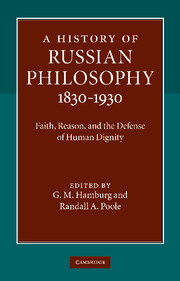Book contents
- Frontmatter
- Contents
- List of contributors
- Acknowledgments
- Introduction: The humanist tradition in Russian philosophy
- I The Nineteenth Century
- II Russian Metaphysical Idealism in Defense of Human Dignity
- III Humanity and Divinity in Russian Religious Philosophy after Solov′ëv
- 8 A Russian cosmodicy: Sergei Bulgakov's religious philosophy
- 9 Pavel Florenskii's trinitarian humanism
- 10 Semën Frank's expressivist humanism
- IV Freedom and Human Perfectibility in the Silver Age
- V Russian Philosophy in Revolution and Exile
- Afterword: On persons as open-ended ends-in-themselves (the view from two novelists and two critics)
- Bibliography
- Index
9 - Pavel Florenskii's trinitarian humanism
Published online by Cambridge University Press: 05 June 2012
- Frontmatter
- Contents
- List of contributors
- Acknowledgments
- Introduction: The humanist tradition in Russian philosophy
- I The Nineteenth Century
- II Russian Metaphysical Idealism in Defense of Human Dignity
- III Humanity and Divinity in Russian Religious Philosophy after Solov′ëv
- 8 A Russian cosmodicy: Sergei Bulgakov's religious philosophy
- 9 Pavel Florenskii's trinitarian humanism
- 10 Semën Frank's expressivist humanism
- IV Freedom and Human Perfectibility in the Silver Age
- V Russian Philosophy in Revolution and Exile
- Afterword: On persons as open-ended ends-in-themselves (the view from two novelists and two critics)
- Bibliography
- Index
Summary
It would be difficult to find in the annals of any nation's cultural and intellectual history a figure so wide-ranging and at the same time so paradoxical as Pavel Aleksandrovich Florenskii (1882–1937). Born into an educated family (his mother was artistic, while his father was an engineer descended from a line of Orthodox priests), Florenskii studied mathematics and philosophy at Moscow University, then went on to study at the Moscow Theological Academy, receiving his ordination to the priesthood in 1911. The range of subjects that he studied and on which he published is staggering: philosophy, theology, philosophy of language, mathematics, physics, electrical engineering, literature, art history, psychology, logic, botany, and others. He was equally at home discussing Kant's antinomies, the theory of perspective in art, the concept of divine Sophia in Russian Orthodoxy, mathematical discontinuity, Einstein's relativity, and Flaubert's Temptation of Saint Anthony. The footnotes in his scholarly works show a range of reading that boggles the mind.
TRINITY AND TRUTH
Florenskii first truly made a name for himself with the publication, in 1914, of what might be described as his magnum opus, a long book bearing the initially puzzling title The Pillar and Ground of the Truth and the equally puzzling subtitle An Essay in Orthodox Theodicy in Twelve Letters. In I Timothy (3:15), “the pillar and foundation of the truth” (or “pillar and ground of the truth,” in the King James translation) refers to “the church of the living God,” in a chapter on the proper conduct of bishops, women, and deacons in that church.
Keywords
- Type
- Chapter
- Information
- A History of Russian Philosophy 1830–1930Faith, Reason, and the Defense of Human Dignity, pp. 190 - 204Publisher: Cambridge University PressPrint publication year: 2010



